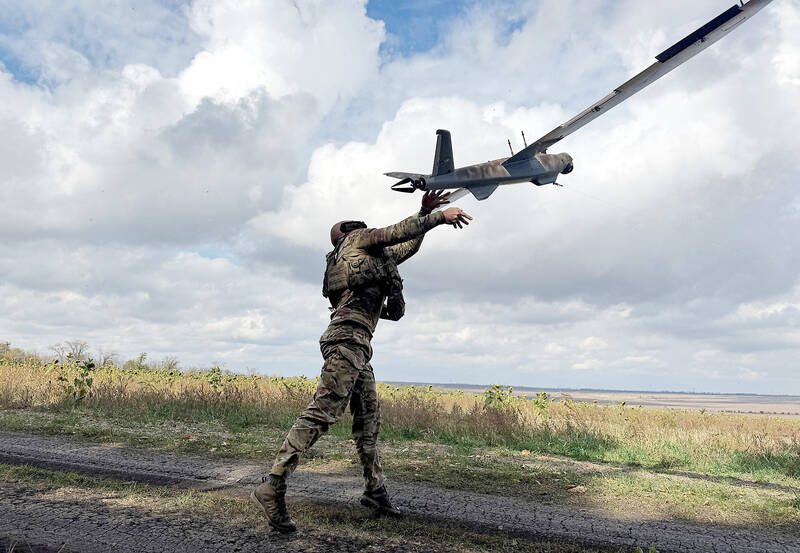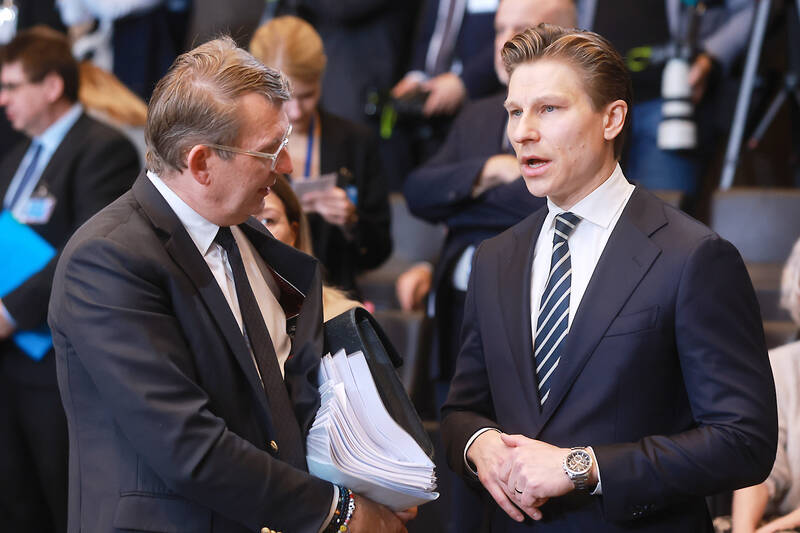Defeating Russia’s invasion of Ukraine is critical to restraining China in the Indo-Pacific, Finland’s defence minister has said, warning Europe and democratic partners, including Australia, face a fight of global consequences.
Antti Hakkanen praised Donald Trump’s decision to impose sanctions on two Russian oil companies last week, calling the move a major sign of resolve by the US president against Vladimir Putin’s three-year long war.
Hakkanen said the West’s willingness to stay the course in opposing Russia’s aggression would be closely scrutinized.

Photo: Reuters
“China is watching. Does the West have a muscle and resilience, when the autocrats and dictators think they can wage war for another year, and the democratic countries will become fed up?
“No. We have to show that we are even more putting stronger support against violence. It’s not only on Ukraine. It’s against violence, against war, and that’s a signal also for China and the Indo-Pacific area.”
Ending the Ukraine conflict required a three-pillar approach, he said: tougher sanctions on the Russian economy and energy exports; stronger military assistance to Ukraine; and the use of long-range weapons to destroy factories for drones and missiles.

Photo: EPA
But Trump has resisted pressure to allow Ukraine to use American Tomahawk cruise missiles to strike targets deep inside Russia. Despite lobbying from Ukraine’s president, Volodymyr Zelenskyy, and calls for long-range capabilities on Friday from the British prime minister, Keir Starmer, Trump has argued the weapons are too complex and require years of training.
Hakkanen said any weakness in resolve would embolden China.
“If there will be some kind of military conflict in the Indo-Pacific area, caused by China, Russia will be somehow involved, through supporting China or something like that,” he said.
“We see now that Russia, by their own resources, cannot continue this kind of warfare, but China is helping them a great deal. They are giving a lot of money to support their economy, from energy exports, and giving them a lot of military components and industrial cooperation.”
Finland shares a land border of more than 1,300km with Russia and considers Putin a permanent threat to European security. The country joined the NATO alliance in 2023 and its president, Alexander Stubb, has secured close ties with Trump.
Hakkanen said China’s president, Xi Jinping (習近平), should take note of the resolve shown by the global democratic alliance, including the “coalition of the willing,” of which Australia is a member.
China considers Taiwan part of its territory and foreign policy experts believe Beijing is aiming to be capable of making a military move against its independence as early as 2027, amid increased military activity in the Taiwan Strait and the South China Sea.
While criticizing countries not pulling their weight with Ukraine, Hakkanen said he was optimistic about possible peace.
“European countries have in the last month or so chosen really good steps in supporting Ukraine, investing heavily in our own defiance.”
Cooperation on the war could have broader flow-on effects for Australia’s trade ties with Europe.
Finland is seeking to expand defense industrial and space ties with Australia. Its political state secretary for foreign affairs, Pasi Rajala, has visited Australia and New Zealand in recent months.
Hakkanen, who has met the defense minister, Richard Marles, said Australia had played a “tremendous” role as one of the biggest non-NATO contributors supporting Ukraine.
“It’s a big political message here in Europe, that Australia has been a part of the support,” he said. “That will send the signal that if Australia has some challenges in security or defense, Europe knows that we have to be in the same family.”

Oct. 27 to Nov. 2 Over a breakfast of soymilk and fried dough costing less than NT$400, seven officials and engineers agreed on a NT$400 million plan — unaware that it would mark the beginning of Taiwan’s semiconductor empire. It was a cold February morning in 1974. Gathered at the unassuming shop were Economics minister Sun Yun-hsuan (孫運璿), director-general of Transportation and Communications Kao Yu-shu (高玉樹), Industrial Technology Research Institute (ITRI) president Wang Chao-chen (王兆振), Telecommunications Laboratories director Kang Pao-huang (康寶煌), Executive Yuan secretary-general Fei Hua (費驊), director-general of Telecommunications Fang Hsien-chi (方賢齊) and Radio Corporation of America (RCA) Laboratories director Pan
The consensus on the Chinese Nationalist Party (KMT) chair race is that Cheng Li-wun (鄭麗文) ran a populist, ideological back-to-basics campaign and soundly defeated former Taipei mayor Hau Lung-bin (郝龍斌), the candidate backed by the big institutional players. Cheng tapped into a wave of popular enthusiasm within the KMT, while the institutional players’ get-out-the-vote abilities fell flat, suggesting their power has weakened significantly. Yet, a closer look at the race paints a more complicated picture, raising questions about some analysts’ conclusions, including my own. TURNOUT Here is a surprising statistic: Turnout was 130,678, or 39.46 percent of the 331,145 eligible party

The classic warmth of a good old-fashioned izakaya beckons you in, all cozy nooks and dark wood finishes, as tables order a third round and waiters sling tapas-sized bites and assorted — sometimes unidentifiable — skewered meats. But there’s a romantic hush about this Ximending (西門町) hotspot, with cocktails savored, plating elegant and never rushed and daters and diners lit by candlelight and chandelier. Each chair is mismatched and the assorted tables appear to be the fanciest picks from a nearby flea market. A naked sewing mannequin stands in a dimly lit corner, adorned with antique mirrors and draped foliage

The election of Cheng Li-wun (鄭麗文) as chair of the Chinese Nationalist Party (KMT) marked a triumphant return of pride in the “Chinese” in the party name. Cheng wants Taiwanese to be proud to call themselves Chinese again. The unambiguous winner was a return to the KMT ideology that formed in the early 2000s under then chairman Lien Chan (連戰) and president Ma Ying-jeou (馬英九) put into practice as far as he could, until ultimately thwarted by hundreds of thousands of protestors thronging the streets in what became known as the Sunflower movement in 2014. Cheng is an unambiguous Chinese ethnonationalist,